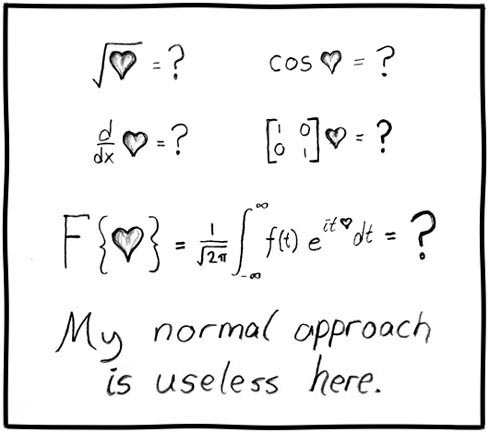« Norwegian media - Free, but dependent | Main | I want to live in English »
March 4, 2010
Love in any language
We have different words because we have differents concepts, but sometimes I wonder if we have different concepts because we have different words. This is especially true when it comes to ideas that are hard to define. Take love for example.

Americans say I love you for all sorts of reasons to many different people in their lives. It’s the same verb for loving ice cream and loving the person you’re married to. Norwegians have two completely different ways of expressing love.
We say Jeg er glad i deg to close friends and family. This sentence means more to me than the English I love you normally does, but it's still not that one specific you're-the-one kind of I love you that people make a big deal about saying or not saying. Because for Norwegians that’s a sentence we expect to only say to a very few people during our lives, maybe just one. The Norwegian words for that are almost taboo; even writing them out without a specific person in mind feels wrong. When I was ten, an American wanted to learn how to say I love you in as many languages as possible, but I refused to teach the Norwegian version.
The difference between the two isn't as simple as one being romantic and the other platonic. Jeg er glad i deg can be romantic, only less so. And because Norwegians are more direct in their way of using language than English-speaking people usually are, we don't say Jeg er glad i deg to just anyone. Except for teenagers who (used to? I'm older now) finish texts with the abbreviation GID. But this Norwegian, less scary version of I love you is closer to I am fond of you, which I would barely take as a compliment in English. Glad means happy, just like in English, so I suppose there is an element of Your existence makes me happy. We can also be glad i things, but I seldom use the term for anyone or anything I'm not at least a little bit emotional about. I like (liker) my furniture, but I love (glad i) my apartment.
Even after years and years of living among Americans who use I love you as a general greeting with people they just like, it still feels weird to me. I have to stop myself from flinching when I hear an American finish an angry-sounding phone call to a family member with an angry I love you and I automatically translate it in my head. But speaking two languages fluently gives me twice as many ways to think about everything. There are some feelings I can only express in English and some I can only express in Norwegian, but in my own thoughts, I can sort out my emotions using my whole vocabulary. And I'm glad I can.
...
Inspired by Even in English, A Language Gap, in which Jennifer Percy writes for the New York Times:
"He speaks Serbo-Croatian, German and English. Two languages separate us.
I don’t speak German but I’ve said “ich liebe dich” plenty of times and it never does feel like a contract the way saying “I love you” feels like a contract. He, too, has said ich liebe dich to me. When we first started dating, this should have been a comfort to me, but it wasn’t. German sounded strange and ich liebe dich sounded ugly to my ear compared to “I love you.” It bounced off of me, it didn’t stay, didn’t embed itself like “I love you.”
I once tried saying “volim te” — “I love you” in Serbo-Croatian — and he didn’t respond. I asked if I’d said it right and he said I had. Then he repeated it quietly.
That’s the one, I thought: volim te. That’s the “I love you” that works for me, the one that is honest."
Image: xkcd
Posted by Julie at March 4, 2010 1:10 PM
Trackback Pings
TrackBack URL for this entry:
http://www.espen.com/cgi-local/mt/mt-tb.cgi/2517
Comments
It's true that the same word is used in English to express feelings for ice cream, your mother, and your lover, but I don't think that means these feelings are all the same. I think most English speaking people recognize that the love you feel for ice cream is different from the love you feel for your lover and the love you feel for your mother. Which love you mean depends on the context. I suppose this makes the English phrase "I love you" more ambiguous than the Norwegian phrases.
Posted by: Julie from Boston at March 5, 2010 3:53 PM